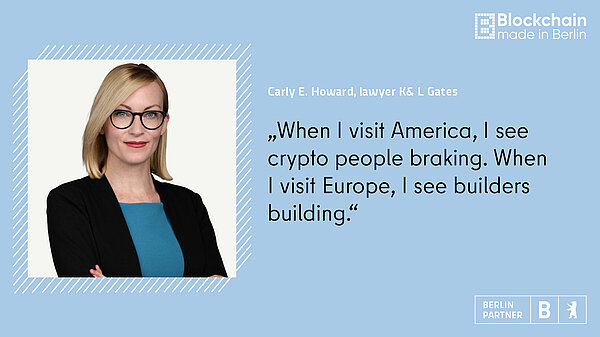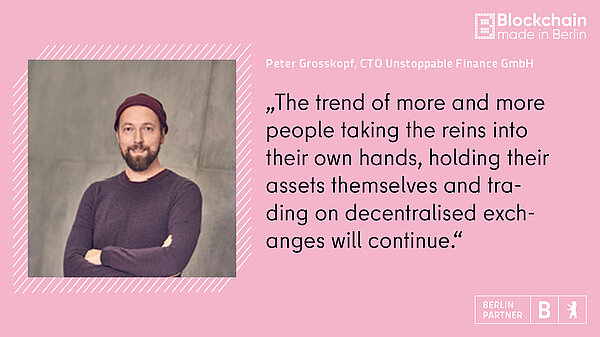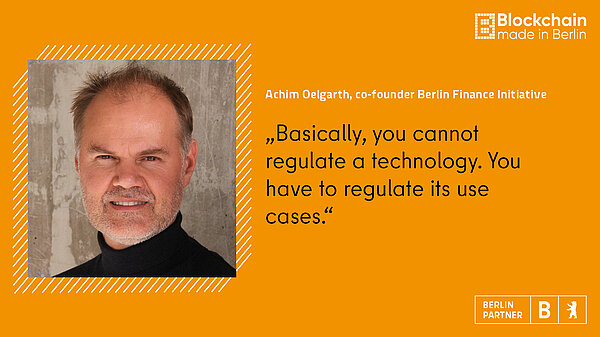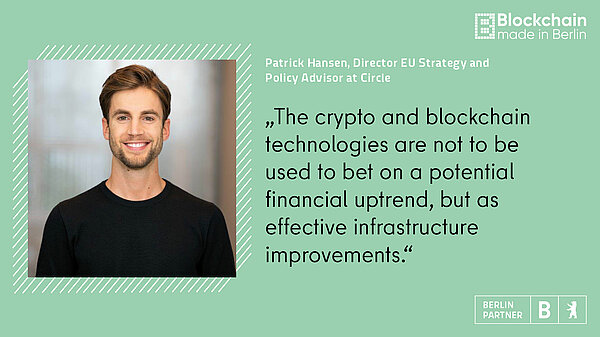In the first half of 2022, both the U.S. and the European Union announced that they would introduce regulations in the area of cryptocurrencies and Decentralized Finance (DeFi) for the first time. DeFi generally stands for a collective term for financial services offered via blockchains). These developments address a demand from the industry, which has been calling for more regulatory clarity for some time.
"Both jurisdictions share similar goals of protecting consumers, avoiding financial stability risks, providing legal clarity, promoting responsible innovation, and, albeit to a lesser extent, strengthening their financial and monetary systems," said Patrick Hansen, Director EU Strategy and Policy Advisor at Circle. The global financial technology company enables businesses of all sizes to harness the capabilities of digital currencies and public blockchains for payments, commerce and financial applications worldwide. However, he said, those are the only parallels between approaches in the U.S. and Europe.
Of builders & brakers
In fact, for now, the regulatory promise in the U.S. is just an executive order issued by U.S. President Joe Biden in March 2022. Except for the six policy goals - consumer protection, financial stability, combating the use of crypto for crime, U.S. competitiveness, financial, inclusive and responsible innovation - little is set in concrete.
"America has not passed comprehensive, meaningful legislation related to crypto," criticizes Carly E. Howard, an attorney specializing in cryptocurrency law issues at global law firm K&L Gates. "Government agencies that normally set industry compliance standards appear to be embroiled in territorial disputes over jurisdiction over digital asset activities, so the crypto industry is turning to Congress to resolve such issues. Some agencies regulate through enforcement (see OFAC sanctions against Tornado Cash). Meanwhile, U.S. courts create 'bad law by bad facts' through precedent (see CFTC v. Ooki DAO)."

Individual U.S. states have tried to pass state laws with guidelines for crypto markets, he said: for example, New York City has banned almost all crypto mining and all new mining operations that are not 100 percent renewable. Howard doesn't think other U.S. states will follow suit, however: "It's more likely that U.S. states will curb mining energy use by incentivizing good behavior with tax incentives for solar energy use, carbon credits, and other clean energy initiatives," she says. In general, the problem is that "the 50 states have very different crypto laws, and federal regulations often overtrump state law, whether technically or practically," knows the expert, who works in both Berlin and Miami. "When I visit America, I see crypto people braking and asking a lot of questions. When I visit Europe, I see builders building."
Europe takes the lead
"The EU has adopted a comprehensive regulatory structure for digital assets, while U.S. policymakers are still weighing how to move forward with federal regulation," confirms Patrick Hansen, who has already worked on the issue as divisional director for blockchain at the German digital association Bitkom.
Among the most important new regulations are that companies that want to issue and sell cryptocurrencies in the EU will in future need a license from a supervisory authority in an EU country. This will allow firms to serve customers in all 27 member countries. The countries' supervisory authorities will have to report to the European Financial Market Authority ESMA any large operator they have authorized.
In order to track crypto transfers in the future, crypto platforms will have to determine information about the senders and recipients when a transaction is processed, no matter what the size. If there is a suspicion of money laundering or terrorism, the providers must forward the collected data to the competent authorities. This regulation only applies to cases in which Bitcoin, Ether and other digital currencies are exchanged for conventional money such as euros or US dollars. Direct transfers between holders of platform-independent crypto wallets will be excluded.
In addition, the EU regulations will entitle holders of stablecoins to reclaim their money free of charge in the future. Issuers must maintain a minimum level of liquidity. They will also be monitored by the European Banking Authority (EBA). Companies that want to issue Stablecoins must also have a registered office in the EU. There will be restrictions on stablecoins pegged to non-European currencies.
Non-fungible tokens (NFTs) are only included in crypto regulations under certain conditions. If they behave like traditional securities, the EU's MiFID financial market rules may apply. The EU Commission plans to review whether standalone rules are needed for NFTs within 18 months.
Also still in the drafting phase are standards and sustainability rules on how crypto firms should disclose the impact of their cyberdevices on the environment and climate change.

MiCA: Export hit or innovation killer?
Within the European Union, the "Markets in Crypto-Assets" (MiCA) regulation is intended to create uniform EU-wide rules for dealing with digital currencies and cryptoassets. Until now, the applicable rights have varied from country to country. MiCA aims to provide a clear legal framework across the EU that will enable innovation in the industry on a safe and sound basis.
"Personally, I believe that MiCA has a holistic, regulatory approach to protecting customers and making markets fair," says Peter Grosskopf, co-founder and CTO of Unstoppable Finance GmbH and Berlin Finance Initiative (BFI) Ambassador. "After all, a set of rules is now also emerging that creates a common European standard. It will therefore be easier for service providers to offer their services throughout Europe. Money laundering and such issues will be addressed. Regulation in the U.S. is not yet standardized. I think it's a historic opportunity for the EU and the US to create common standards. Like the General Data Protection Regulation (GDPR) already, MiCA could become an export hit."
The fear of some critics that the regulatory framework will have a negative impact on innovation within the EU, putting European countries like Germany at a disadvantage in Web3, is shared by the expert only to a limited extent: "That remains to be seen. For centrally offered services, it creates a regulatory framework that offers customers more protection. If the operational implementation offers too many hurdles and the authorities work too slowly, it will become a disadvantage for local providers."
Achim Oelgarth, co-founder of the Berlin Finance Initiative and CEO of the East German Banking Association, also says it is too early to tell whether regulation will put Europe at a disadvantage in the coming Web3. "There are still large grey areas that should be clarified by MiCA," he says. In general, he says, bureaucracy and regulation are not attractive features for the crypto industry, "which is designed to address the deficit of centralization. Moreover, rising costs and complexity are never a good sign for innovation. The real answer is how to actually define true innovation."
Meeting certain regulatory requirements to increase crypto adoption is necessary, according to Oelgarth. Many people in the industry are also aware of this, he said. In order to satisfy the needs of both parties, Achim Oelgarth pleads for better dialog and open-mindedness on the part of the regulatory authority.
Differentiated regulation of applications necessary
So far, MiCA regulation has only applied to centralized entities. These are "simply put, banks that provide cryptos to their clients instead of fiat and shares," Oelgarth says.
"Because they are intermediaries, the risks are very similar to those of banks and other financial service providers (e.g., trust in the proper delivery of the service)," explains Peter Grosskopf. "In the decentralized world of DeFi and Web3, the risks are different because the service is provided by machines. The biggest risk here is conceptual and programming errors. Decentralized applications are not covered by MiCA, and that's a good thing, especially since regulation here has yet to evolve to reflect market circumstances."

This should remain the case for a while, emphasizes Achim Oelgarth: "We should not try to bring them under a single set of regulations, but instead try to understand the different use cases. To give an example, let's look at NFTs. If you legislate that NFT is a security and nothing else, you put at risk a whole world of applications where NFTs are used outside the investment framework, such as certification or digital identifiers. Fundamentally, you can't regulate a technology. You have to regulate its use. Some scenarios require strict regulation, others need to be more flexible." Regulation can therefore become a real enabler for applications of future technologies through a differentiated approach.
Launch planned for March
The current version of the MiCA is scheduled to go into effect in March, according to Patrick Hansen. "It's going to be sporty," grins Peter Grosskopf, "you still have to pass MiCA. Let's see how long there will be delays here." The bureaucratic apparatus still has to be built up, he points out as a hurdle. In addition, regional supervisors would retain a function. "Here, it will be crucial that equal standards are applied and that regulatory arbitrage does not arise again."
The U.S. is not there yet: "That America will pass crypto legislation this year is possible, but it is more likely that no legislation will be passed - especially if nothing is done before the start of the 2024 election cycle," Carly E. Howard says. "The more likely scenario is that while other jurisdictions (like Europe) work together to advance the digital asset space, America will continue to struggle in this regard."

2023: Global Collaborations, Adaptation & Infrastructure Enhancements
When asked what else she expects to see in 2023, the U.S. attorney has a short answer: "First, interoperability [note: interaction of different systems, techniques or organizations]; second, real-world resources; and third, user experience," she says. "It wouldn't hurt to have fewer acronyms, either," she adds with a grin.
Exchanges at the global level are also to be intensified this year. After an initial delegation trip from Berlin Partner to Miami, another excursion to the West Coast is to take place and focus primarily on regulations in the crypto and DeFi sectors in Europe (specifically Germany) compared to the US. As with the previous trip, Carly E. Howard wants to be part of this one because, "Berlin's tech ecosystem has been vibrant for many years and is rebuilding even stronger after the pandemic. I would like to continue to build on this momentum. For those interested in participating in the next events, it seems like a smart strategy to start companies in Europe, where costs are lower and regulation is more certain, while gaining the support of enthusiastic American investors, whether in Miami, San Francisco or elsewhere."
In this way, interesting projects could emerge, Achim Oelgarth is also sure, and believes that after the "revelation and collapse of various not-so-well-structured and managed crypto projects, where the protagonists took advantage of the hype and lack of industry knowledge and diligence to line their pockets with a lot of money," the industry will focus more on adaptation instead of speculation in the future.
Moving away from speculation to the "utility phase" is also the prognosis on the part of Patrick Hansen: the "crypto and blockchain technologies [should] not be used to bet on a potential financial uptrend, but as effective infrastructure improvements that serve the economic and financial needs of millions of people worldwide. This has been central to Circle's mission from day one. And we have launched several partnerships and offerings in recent months that focus very specifically on this area. We announced an initiative with MoneyGram, Stellar Development Foundation and UNHCR to provide immediate and safe humanitarian aid to Ukrainians affected by the war. We've also partnered with Checkout.com to introduce a stablecoin-based payment processing layer on their platform that will allow merchants to process payments on weekends and holidays, which is currently not possible in the fiat system." He sees real-world use cases and benefits in 2023 becoming increasingly prominent. "The speculation and investment side of crypto definitely plays a role, but will continue to be dominated by the macroeconomic environment, which I don't expect to improve dramatically this year."
In any case, an end to the crypto and DeFi boom is not in sight, on the contrary: "The trend of more and more people taking the reins into their own hands, storing their assets themselves (non-/self-custodial) and trading on decentralized exchanges will continue," Peter Grosskopf sums it up. "Then users will no longer have to trust service providers/intermediaries, but only themselves and the technology. Just like the basic idea of crypto was: your keys, your coins."
Sources:
- Berlin Finance Initiative: https://berlin-finance-initiative.de/
- Bitkom: https://www.bitkom.org/
- CFTC vs. Ooki DAO: https://www.coindesk.com/policy/2023/01/12/cftc-calls-for-default-judgement-against-ooki-dao-in-ongoing-lawsuit/
- Checkout.com: https://www.checkout.com/
- Circle: https://www.circle.com/en/
- ESMA: www.esma.europa.eu/
- GDPR: gdpr-info.eu/
- K&L Gates: https://www.klgates.com/
- MiCA www.europarl.europa.eu/thinktank/en/document/EPRS_BRI(2022)739221
- MoneyGram: https://www.moneygram.com/mgo/de/de/
- New York City: Ban of Crpyto Mining: https://t3n.de/consent?redirecturl=/news/umweltschutzgruenden-new-york-kryptomining-1515232/
- OFAC sanctions against Tornado Cash: https://blog.chainalysis.com/reports/tornado-cash-ofac-designation-sanctions/
- Ostdeutscher Bankenverband: https://ostbv.de/
- Stellar Development Foundation: https://stellar.org/foundation
- UNHCR: https://www.unhcr.org/dach/de
- Unstoppable Finance: https://ultimate.money/




